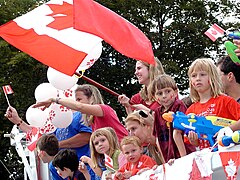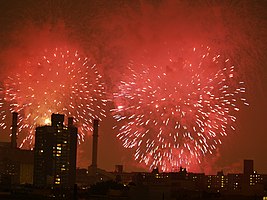July 4th - Independence Day (USA) From Wikipedia, the free encyclopedia
Public holidays in the United Kingdom From Wikipedia, the free encyclopedia -- ... the United Kingdom has no national day holiday marked and/or celebrated. The lack of a formal founding date and no constitution may be the reason for the lack of a national day. (SSTattler: Same Australia, New Zealand, India, ...)
 |
Children watch the Canada Day parade in Montreal
|
 |
Street hockey on Trafalgar Square,
in front of the National Gallery,
for Canada Day (in London, England !!)
|
Commemoration
Frequently referred to as "Canada's birthday", particularly in the popular press, the occasion marks the joining of the British North American colonies of Nova Scotia, New Brunswick, and the Province of Canada into a federation of four provinces (the Province of Canada being divided, in the process, into Ontario and Quebec) on July 1, 1867. Canada became a kingdom in its own right on that date, but the British parliament and Cabinet kept limited rights of political control over the new country that were shed by stages over the years until the last vestiges were surrendered in 1982, when the Constitution Act patriated the Canadian constitution.
Under the federal Holidays Act, Canada Day is observed on July 1, unless that date falls on a Sunday, in which case July 2 is the statutory holiday, although celebratory events generally take place on July 1, even though it is not the legal holiday. If it falls on a Saturday, any businesses normally closed that day will generally dedicate the following Monday as a day off.
See the full article:
Canada Day From Wikipedia, the free encyclopedia
 |
| New York City's fireworks display, shown above over the East Village, is sponsored by Macy's and is the largest in the country |
Background
During the American Revolution, the legal separation of the Thirteen Colonies from Great Britain occurred on July 2, 1776, when the Second Continental Congress voted to approve a resolution of independence that had been proposed in June by Richard Henry Lee of Virginia declaring the United States independent from Great Britain. After voting for independence, Congress turned its attention to the Declaration of Independence, a statement explaining this decision, which had been prepared by a Committee of Five, with Thomas Jefferson as its principal author. Congress debated and revised the wording of the Declaration, finally approving it on July 4. A day earlier, John Adams had written to his wife Abigail:
The second day of July, 1776, will be the most memorable epoch in the history of America. I am apt to believe that it will be celebrated by succeeding generations as the great anniversary festival. It ought to be commemorated as the day of deliverance, by solemn acts of devotion to God Almighty. It ought to be solemnized with pomp and parade, with shows, games, sports, guns, bells, bonfires, and illuminations, from one end of this continent to the other, from this time forward forever more.Adams's prediction was off by two days. From the outset, Americans celebrated independence on July 4, the date shown on the much-publicized Declaration of Independence, rather than on July 2, the date the resolution of independence was approved in a closed session of Congress.
Historians have long disputed whether Congress actually signed the Declaration of Independence on July 4, even though Thomas Jefferson, John Adams, and Benjamin Franklin all later wrote that they had signed it on that day. Most historians have concluded that the Declaration was signed nearly a month after its adoption, on August 2, 1776, and not on July 4 as is commonly believed.
See the full article:
Independence Day (United States) From Wikipedia, the free encyclopedia


No comments:
Post a Comment